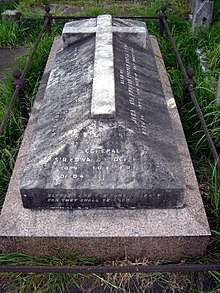Edward Hodge
General Sir Edward Cooper Hodge GCB (19 April 1810 – 10 December 1894) was a British Army officer.[1]
Sir Edward Cooper Hodge GCB | |
|---|---|
| Born | 19 April 1810 |
| Died | 10 December 1894 (aged 84) |
| Buried | Brompton Cemetery, London |
| Allegiance | |
| Service/ | |
| Rank | General |
| Commands held | 4th (Royal Irish) Regiment of Dragoon Guards 5th Dragoon Guards |
| Battles/wars | Crimean War |
| Awards | Knight Grand Cross of the Order of the Bath |
Biography

Hodge was the son of Major Edward Hodge (1782–1815) of the 7th Hussars, who distinguished himself in the Peninsula War and in the Waterloo Campaign.
As a Lieutenant-Colonel, Edward Cooper Hodge commanded the 4th (Royal Irish) Regiment of Dragoon Guards at the Battle of Balaclava. He was subsequently placed in command of the 5th Dragoon Guards, and later rose to the rank of General.
Hodge was the author of a diary, edited by the Marquess of Anglesey and published as Little Hodge: Being Extracts from the Diaries and Letters of Colonel Edward Cooper Hodge Written During the Crimean War, 1854-1856
He is buried in Brompton Cemetery, London.
Family
In 1860 Edward Cooper Hodge married Lucy Anne, second daughter of James Rimingt'on. Esq, of Broomhead Hall, Yorkshire
Notes
References
- "Period paintings, historical portraits and fine art in London - Major Edward Hodge (1782-1815)", Miles Barton, archived from the original on 3 October 2011, retrieved 11 May 2015
Further reading
- "General Hodge", British Medals, retrieved 11 May 2015
- "W.Bro. Lieutenant-General Edward Cooper Hodge Worshipful Master St. Patrick's Lodge No. 295 1835.", Irish Masonic History and the Jewels of Irish Freemasonry, retrieved 11 May 2015
| Military offices | ||
|---|---|---|
| Preceded by Sir James Chatterton |
Colonel of the 4th Royal Irish Dragoon Guards 1874–1894 |
Succeeded by William Godfrey Dunham Massy |
| Preceded by Sir Charles Routledge O'Donnell |
Colonel of the 18th Royal Hussars 1870–1874 |
Succeeded by Sir Thomas Westropp McMahon |